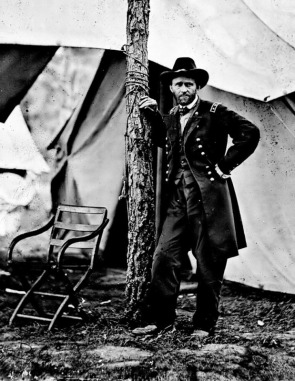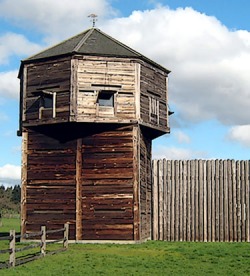The Life & Times of Ulysses S. Grant
Growing Family
After the Mexican-American War ended in early 1848, Grant married Julia Boggs Dent, the sister of his former West Point roomate and war buddy. The pair had a son, Frederick Dent Grant, named after his uncle (the roommate.) Afterwards, while Julia was pregnant with Ulysses S. Grant, Jr. , Grant Senior was reassigned to Fort Vancouver (pictured below) in what is now Washington state, as quartermaster of the 4th Infantry Regiment. Julia, unfortunately, could not accompany him. His pay was not enough to support the many needs of a frontier family; his wife and children would be better of on the east coast than the west.
Grant tried many business ventures in order to augment his meager pay, but to no avail. His family was unable to join him, and Grant suffered many lonely years on the West Coast. One somewhat bright spot in his experiences there, however, was his promotion to captain in 1853---an honor that, in this peacetime, was only shared by 49 others on active duty. But even this small gain turned out for the worse, as Grant's promotion brought with it a reassignment to Fort Humboldt, California, with a very unpleasant reputation and a troll of a commanding officer. Grant's drinking problem began on his lonely sojourn in the west, and is said to have possibly interfered with his career interests. In 1854, Grant actually resigned from the Army. Whether this abrupt resignation was due to intoxication on duty or simply being miserable with military life is still debated today.
The General Out of a Job

http://cwmemory.com/wp-content/uploads/2009/06/ulysses-grant.jpg
Out of the Army, Grant moved to the Dent estate in Missouri to farm on 80 acres of land that Julia's father had given to them. While this venture looked hopeful, it ended in failure, much like other of Grant's pursuits. Now in his thirties, Grant labored on this farm from 1854 until 1858, when he left for a real-estate partnership in St. Louis, Missouri. Both this and a bill-collecting phase ended poorly as well. Finally, Grant swallowed his pride and took a job at his father's tannery in Galena, Illinois, a position that he stuck to until the outbreak of civil war in the United States.
Ironically, future president Grant remained decidedly undecided as to his political preferences during this time. His father-in-law was a well-known Democrat in St. Louis, and Grant voted for Democrat James Buchanan for president in 1856. He even supported his future commander-in-chief and friend's opposition in 1860, when he supported Stephen A. Douglas instead of Abraham Lincoln! He did not actually vote in 1860, however, and then allowed private letters of his to be used as campaign literature for Lincoln. Finally, Grant ended his avoidance of most things political in 1868 when he openly declared himself a Republican, though this was three years after the U.S. Civil War had ended.
The years between the wars of his time were hard on Grant. He was separated from his family for most of them, began his drinking problem, and failed in numerous business ventures. He eventually had to go running back to his father to get a job! It can reasonably be inferred that this period of his life was not Grant's favorite; yet this era of his life shaped him into the kind of person that could lead the military of a fractured nation to a solid victory. As is often the case, time of adversity were the most important in Grant's life.
Ironically, future president Grant remained decidedly undecided as to his political preferences during this time. His father-in-law was a well-known Democrat in St. Louis, and Grant voted for Democrat James Buchanan for president in 1856. He even supported his future commander-in-chief and friend's opposition in 1860, when he supported Stephen A. Douglas instead of Abraham Lincoln! He did not actually vote in 1860, however, and then allowed private letters of his to be used as campaign literature for Lincoln. Finally, Grant ended his avoidance of most things political in 1868 when he openly declared himself a Republican, though this was three years after the U.S. Civil War had ended.
The years between the wars of his time were hard on Grant. He was separated from his family for most of them, began his drinking problem, and failed in numerous business ventures. He eventually had to go running back to his father to get a job! It can reasonably be inferred that this period of his life was not Grant's favorite; yet this era of his life shaped him into the kind of person that could lead the military of a fractured nation to a solid victory. As is often the case, time of adversity were the most important in Grant's life.

